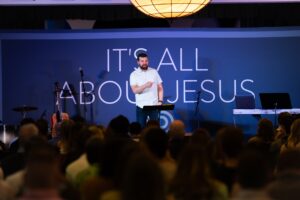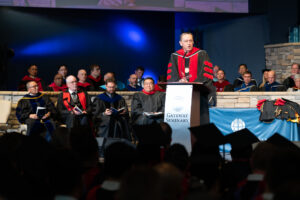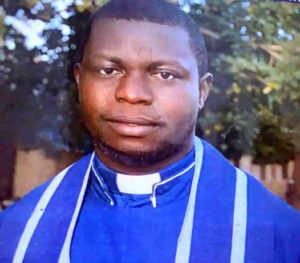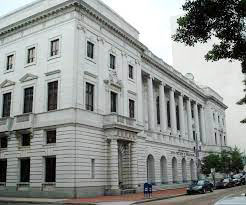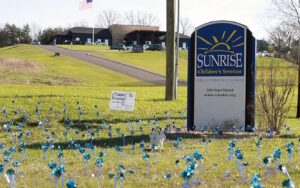
COLORADO SPRINGS, Colo. (BP)–While an investigation into alleged religious intolerance at the Air Force Academy hasn’t affected evangelical ministries at the campus, Southern Baptists who work with cadets are concerned about its long-term implications.
“There’s an immediate concern the pendulum may swing and bring an extreme reaction,” said Bill Gandy, Baptist Student Union director with the Pikes Peak Baptist Association. “Because of high media exposure, there’s a lot of pressure coming from a lot of different places.”
Such pressure could mean prohibitions on cadets even sending religious-themed e-mails to friends, Gandy said.
Because of widely reported allegations of religious bias, echoed by a group from Yale divinity school who visited the campus last year, the Air Force sent a team to the academy in May to investigate.
In addition to interviewing 20 key personnel, the Air Force inquiry included focus groups with various cadets among 4,300 on campus and with professors, staff members and coaches.
The panel issued a 100-page report in late June covering a series of 55 complaints lodged by 13 individuals over a four-year period. Among the recommendations: the development of policies regarding religious expression and a plan promoting respect for diverse cultures and beliefs.
The team found that failing to address the needs of cadets from minority faiths created the impression among some cadets that the academy was insensitive to their religious beliefs.
“There were also reports … that some cadets had been overly aggressive in the expression of their faith, offending some and, in some cases, creating an impression of insensitivity regarding the beliefs of others,” the report said.
“Likewise, some members of the faculty and staff also have strong religious beliefs that have, on occasion, been expressed in ways that others found offensive.”
However, in its conclusion the report said the academy was aggressively addressing a subject that continues to be widely debated in the public arena.
It said the root of the problem is not overt religious discrimination, but a failure to fully accommodate all cadets’ needs. It also cited a lack of awareness over where to draw the line between permissible and impermissible expression of beliefs.
Bob Bender, pastor of a nearby Southern Baptist congregation with an active ministry to cadets, said he agrees that evangelicals should be respectful of other faiths but described the issue as overblown.
Bender, of First Baptist Church of Black Forest, located seven miles east of the academy, said, “We’re concerned about the pendulum swinging the other way. We’re not making any assumptions, though, and will play within the rules of the game, as long as the ground is level.”
Bob Collins, an electrician who has directed First Baptist’s collegiate ministry for four years, wonders if complaints about failing to accommodate other religions will result in all church passes being suspended.
“Cadets get a three-hour pass and have to tell [superiors] where they’re going, how long before they’ll be back and the only place they can go to is church,” Collins said. “The concern is church passes will go away or they will schedule more and more training on Sunday.”
However, amid these concerns the report has had a positive impact.
Gandy said it has stimulated more prayer on his part and among all evangelical ministries at the academy, such as Campus Crusade for Christ, Navigators and the Fellowship of Christian Athletes.
“We’re spending a lot of time in prayer and a lot of time looking at what we’re here for and what we’re about,” the BSU director said. “When a crisis hits, it tends to turn up the prayer burner.”
All three Southern Baptists cite the fact that the investigation boiled down to complaints lodged by 13 individuals over the course of four years as reason for describing the full-blown investigation as an overreaction.
Their claim finds some support in the official report. Various cadet focus groups told investigators there is no problem with free exercise of religion and that reports of problems have been overblown.
Among them were two groups of nearly 20 Catholic cadets, eight cadets from a mixture of faiths, seven cadets who profess no faith and nine cadets of Hindu, Buddhist, agnostic or atheist backgrounds.
Still, Gandy agrees that evangelicals must be sensitive in the way they approach non-believers and adherents to other religions.
One of the issues these ministries are facing is how to instruct cadets to be faithful in presenting gospel truth while respecting differing beliefs, Gandy said.
“There’s kind of a struggle as to how that would look,” Gandy said. “Would being sensitive mean we don’t stand on truth? We have to stand on the love of Christ, whatever we do.
“We need to do it in a loving way, not condescending or judgmentally, but not backing off either. The truth is offensive. Our cadets desire to be loving and demonstrate the love of Christ whenever they stand for truth.”
One technique the BSU director is recommending to cadets is allowing others to express their views.
If someone claims to be an atheist, Gandy coaches Christians to ask the person what brought him or her to that place, and then form a relationship in which they can allow God to persuade that individual of His reality.
“This will be our focus as we interact and as we try to be more sensitive and understand everyone is not where we are,” Gandy said.
Noting that investigators reported that 85 percent of cadets profess to be Christians, Bender said part of the problem is a substantial presence can create the perception of preferential treatment.
The First Baptist pastor said a similar concern is felt among non-military members of its collegiate ministry, where 90 percent of approximately 100 on the rolls come from the academy.
“There’s a perception of being disenfranchised,” Bender said. “We work harder at reaching non-cadets. But is this not a microcosm of our culture at large? Are we fighting the same thing with prayer in public schools? I think so.”
Despite the uncertainties about the report’s possible consequences, Gandy expressed confidence that God’s purposes ultimately will prevail.
“We are trusting in God who knows all things,” Gandy said. “God is using these ministries to impact the lives of students who are impacting the Kingdom.” As a missionary appointed by Southern Baptists’ North American Mission Board, Gandy noted, “I appreciate the gifts of Southern Baptists that make ministry at the Air Force Academy possible.”
–30–






